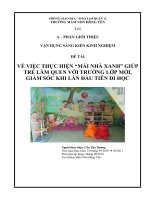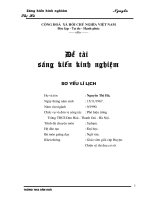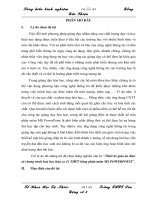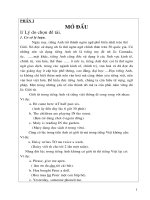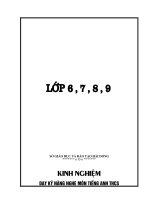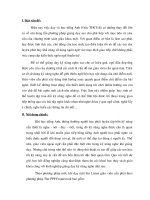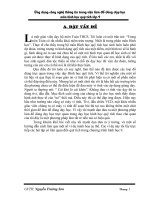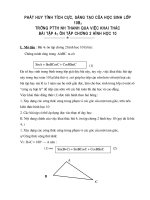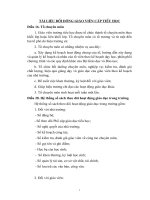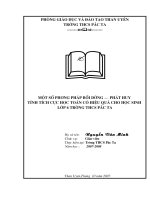sáng kiến kinh nghiệm MAKING USE OF ROLE PLAY IN TEACHING ENGLISH AT HIGH SCHOOL
Bạn đang xem bản rút gọn của tài liệu. Xem và tải ngay bản đầy đủ của tài liệu tại đây (174.76 KB, 16 trang )
SỞ GIÁO DỤC VÀ ĐÀO TẠO THANH HÓA
TRƯỜNG THPT HÀ TRUNG
SÁNG KIẾN KINH NGHIỆM
MAKING USE OF ROLE - PLAY IN TEACHING
ENGLISH AT HIGH SCHOOL
Người thực hiện: Nguyễn Cẩm Thủy
Chức vụ: Giáo viên
Đơn vị công tác: Trường THPT Hà Trung
SKKN thuộc môn: Tiếng Anh
CONTENTS
THANH HÓA NĂM 2015
1
CONTENTS
I. INTRODUCTION
1. REASON FOR CHOOSING THE TOPIC
2. PURPOSE OF THE STUDY
3. OBJECTS OF THE STUDY
4. DURATION OF THE STUDY
5. STUDYING METHOD
II. PROCEDURE
1. RATIONALE
2. REALITY
3. RESULT OF THE REALTY.
4. SOME PRINCIPLES OF USING AND MANAGING ROLE - PLAYS
5. STEPS IN CARRYING OUT ROLE-PLAYS
5.1. Preparation
5.2. Sample lesson plans
III. CONCLUSION AND SUGESTION
1. THE RESULT OF THE SUBJECT
2. CONCLUSION
3. SUGGESTION
2
I. INTRODUCTION
1. REASON FOR CHOOSING THE TOPIC:
Improving the quality of teaching and learning has been a necessary issue,
which concerns the whole society. Teaching and learning must be comprehensive
innovation: content, objectives, methods, means and other requirements. Teaching
today is to promote self-discipline, initiative and creativity of learners.
In recent years, the documents of the State and of the Ministry of Education
and Training emphasized the need to renew teaching methods. The focus of teaching
method innovation is changing from the way of transmission of one-sided teaching,
mainly force the learners memorize knowledge, to positive ways with the guidance
and help of teachers to promote activeness, self- discipline, initiative, creativity, the
spirit of cooperation, to create fun and excitement for learners, so that they can train
their habit and ability in self - learning, but how to have a flexible teaching approach,
engaging the learner, evoking the learning desire of students. It is a question.
Moreover, we all know it isn't easy to learn a language. The process of learning
a language is not only complex but also very long. Learning English is the same.
Theories and exercises in class will become useless if students are not taught how to
apply what they have learnt into practice, because speaking another language in real
life is completely different and often students are confused with their lists of
memorized vocabulary and they don't know how to order in a restaurant or book a
ticket at the airport ….
Through teaching at high school, I realized that I need a new method that meets
those requirements of learners. Using role - play in teaching English is such a method.
Role-play is an effective technique to animate the teaching and learning atmosphere,
arouse the interests of learners, and make the language acquisition impressive. My
subject is "making use of role - play teaching English at high school". So in this
writing, I will mainly focus on how to apply it successfully, make use of it and take
the most advantage of it in English class and the final purpose is to bring daily
situations into classrooms. Therefore learners can communicate in English as the
second language (ESL) in classrooms as well as outside classrooms.
2. PURPOSE OF THE STUDY:
Applying role - play in teaching English at high school is to achieve the
following purposes:
- Contributing in renovation of teaching methods, improving the effectiveness of
teaching and learning, adding knowledge and skills for teachers.
- Making and using various and flexible teaching methods to help students learn and
exploit knowledge actively.
3
- Creating excitement for students, and deepening knowledge, promoting selfdiscipline, independence and creativity of students.
- Equipping students the knowledge, values, attitudes, behavior and healthy habits,
eliminating negative habits, to solve the social issues that are of concern.
3. OBJECTS OF THE STUDY:
To implement the subject, I selected four classes: 10A, 10C, 10Đ, 10H in in
school year 2013-2014 and four classes: 10A,10B,10H, 10G in school year 20142015.
Number Of students: 367
Characteristics of Students: The students in the classes above include excellent
and good students (10A), but most of the rest acquire knowledge slowly, they are
timid and afraid of speech. Therefore, when selecting these students, I hope that my
method will increase student's interest and self confidence in learning English.
4. DURATION OF THE STUDY:
The time for studying this subject is in two academic years 2013 - 2014 and
2014- 2015.
5. STUDYING METHOD:
To study this content, I use some of the following methods:
- Reference document Method: search the theory of educators on the use of role - play
to create interest in learning for students in the educational materials and English
materials related to the topic. Collect documents, knowledge about role - play.
Thereby, filter the information with practical value, which can apply in order to
illustrate and supplement, paraphrase, and deepen English language.
- Observation Method: Regularly take part in colleagues' lesson to observe and learn
enrich my knowledge and teaching skills
- Experimental Methods: Assess the skills of students as well as the effectiveness of
role - play methods through the exercises, tests.
II. PROCEDURE
1. RATIONALE:
Learning to participate is an important skill for students at high school in
today's multimedia world. Role - play method contribute to improve the
understanding of the complexities in professional practice and allows students to
develop the skills to engage in multilateral discussions in a controlled environment of
the classroom. Role - play in the classroom can be done in many ways: online or face
to face interaction. The duration of this process may vary depending on the objectives
of the operation. Role-play requires students active in the learning process by
allowing them to act as partners in a real or imaginary scenario. It is an additional
4
technique for assignment forms and Traditional Teaching in High School. In role
-play, we can see:
- Teachers select an event or a special situation, which helps to clarify the theory or
may be vital for the research topic.
- When prepared, students are provided reading / basic topics and assigned the role of
partners.
- Forms of interaction between partners can be changed and may depend on the time
and resources available.
- Role - play was concluded by an exchange or reflects, reinforce the concepts
introduced by the role - play method.
Role - play creates a stimulating environment, realistic simulation that allows
students to enhance the understanding of the situations acted by them. Students gain a
deeper insight about the key concepts by acting the discussed issues in class. They
also develop skills for professional practice.
Role - play also introduce important concepts in professional practice as
knowledge, how to create and develop it, especially the use of language and the
construction of language, logic and the prominence of voices. Students learn how to
express knowledge in a meaningful and convincing way.
Moreover, role- play clarifies the division and differences among groups and in
the same group. Acting in the classroom effectively demonstrate that different
partners use different information sources and often organize separately, if not the
opposite opinion, but the solution can be achieved. Students learn to work with
different personalities, beliefs, value systems, capabilities and experiences.
Overall, role - play is a useful teaching method as it helps to develop practical
skills and knowledge of academic expertise. And role - play also meets the demand of
the students who generally prefer practical approach to learn and expand knowledge
through the experience simulation.
2. REALITY:
Through investigation, exploration and attendance my colleagues' lessons and
through the process of teaching at Ha Trung high school over the years I see that the
process of teaching and learning English of teachers and students meet some
limitation. This comes from several reasons below:
Teachers at high schools are in the period of getting used to new English
textbook. Role - plays weren't used much in class, so a lot of us – teachers of English
at high school – get stuck in organizing role-plays effectively.
Some teachers haven’t been clearly aware of the effectiveness of role - plays in
teaching and learning a foreign language.
5
What's more? Students haven't still found interested in learning English
because many lessons are difficult as well as impractical for them to learn.
So I find myself that besides using traditional methods as before, to make each
English teaching and learning lesson more attractive, active, passionate for students,
there is an extremely important solution that teachers should use role - plays to teach
and improve the quality of their work. I also see that role - play method can be used
in all blocks: 10, 11, 12 and teachers should design suitable role - plays in lessons
wherever they can.
3. RESULT OF THE REALTY.
To understand the status of the studying problem, I have conducted a survey of
the quality of students in classes 10A, 10C, 10Đ, 10H in my school in academic year
2013 to 2014. Before applying role - play method, the quality of the students is quite
low.
It is clearly that the quality of the subject doesn't really meet the educational
objectives. Thus, I found myself; the renovation of teaching methods in the classroom
must be associated with the strengthening of passion, excitement of learners, helping
them to achieve high results in learning. Role - play bring more efficiency. So, not
much ambition with this topic, I just want to give some basic solutions in the
application of role - play to solve problems that arise in the process of teaching
English.
4. SOME PRINCIPLES OF USING AND MANAGING ROLE - PLAYS:
The outcome shows there are some crucial factors for its success:
- The topic chosen should be real and relevant. The purpose of role-play that applies
to practical usage in communication demands the flexibility of participants' words,
generally speaking, the more approximately the activity access to reality, the more
interests students will take in, so the choice of roles and contexts become very
important
- The teacher:
+ needs 'feed-in' the appropriate language. In the practice stage the teacher has a
chance to 'feed-in' the appropriate language. This may need the teacher to act as a sort
of 'walking dictionary', monitoring the class and offering assistance as and when
necessary. Try to think through the language the students will need and make sure
this language has been presented. Students may need the extra support of having the
language on the board. When the role-play began the students felt 'armed' with the
appropriate language.
+ should create a comfortable atmosphere so that the students wouldn’t feel nervous
and pressed
6
+ as facilitator of the role-play, must support students in their role, spectator or
participant.
+ corrects errors in a proper way. There are many ways to correct mistakes when
using role-play. It is rarely appropriate for the teacher to jump in and correct every
mistake. This could be incredibly de-motivating! Some students do like to be
corrected straight after a role-play activity, while the language is still fresh in their
minds. Sentences with errors can be written on the board for the group to correct
together. Self-correction - the teacher should repeat the students' mistake sentence.
They may find it easy to spot their own mistakes. Peer-correction - Fellow students
may be able to correct some mistakes made by their peers or leave grammar
correction to the end.
- Incorporating role-play into the classroom adds variety, a change of pace and
opportunities for a lot of language production and also a lot of fun!
- The more engaging the better. The value of role-plays comes from students
immersing themselves in the material.
- Preparation is very important to success. Give students 'personality cards' or power
point slices which sketch out their personal characteristics or scenario. Divide
students into groups and give them time to sketch out various scenarios, and go over
extra or special vocabulary, ask them to discuss how they will act, think about the
character and plan what they will say.
- Exaggeration is good! Encourage students to exaggerate their actions, opinions and
movements. Exaggeration helps students immerse themselves in the role.
- Stage a rehearsal first. Have students practice their role in small groups with
coaching from the other students.
- While the role-play or debate is in progress, have other students suggest vocabulary
first, and act as backup if they do not know.
Role-plays are unpredictable which makes them both a valuable learning tool
and at the same time difficult to manage. Sketch out the various routes the role-play
can take from the initial scenario. This will give you some ideas what to expect and
avoid any surprises.
5. STEPS IN CARRYING OUT ROLE - PLAYS:
5.1. Preparation:
- Chooses the topic, based on the topic of the lesson or the main grammar point of
that lesson.
- Prepares materials especially role-play cards (Teachers can make up the cards
themselves, or search for them on the Internet) or role-play slices on Power Point)
- Provides students with enough language to be used in their role-plays.
7
- Makes use of role - play in teaching. It means that teachers should set up the scene
for role-plays and use them in their teaching lessons as many as possible, especially
in Reading and Speaking
5.2. Sample lesson plans:
Sample 1
Unit 1: A day in the life of … (English 10)
B. Speaking
Family Role-play
Duration: 45 minutes
Aim:
Oral fluency practice
Summary: There are 4 roles: mother, father, brother or sister and Quan.
(Depending on the number of boys and girls in each group)
Introduction
The teacher introduces that today students will learn Speaking via role-play. The
teacher will divide class into groups of 4 students. They play their roles in a happy
family as mother, father, brother or sister and Quan
Preparation
Designs lesson plan on Power Point to show four cards providing the information that
help each role what to say.
Procedure
A. WARM UP:
- calls two volunteers to go to the board.
- asks one to write the names of the subjects they are learning at school, and the other
write some phrase words about daily activities:
Student 1:
1. Mathematics
6. English
2. Physics
7. Biology
3. Geography
8. Chemistry
4. Literature
9. History
5. Civic education
10. Physical education
…
Student 2:
1. get up
6. play football
2. brush the teeth
7. watch TV
3. go to school
8. cook
4. go to work
9. have breakfast/lunch/dinner
8
5. do house work
10. …..
- leads in the new lesson.
B. PRE- SPEAKING:
- helps students to revise how to say the time: 7:15, 9:45, 18:30…
- guides students to make some questions:
+ What time do you start work?
+ What do you do in the afternoon?
+ When do you finish school?
…..
C. WHILE - SPEAKING:
- divides class into groups of 4 students and asks them to play roles as father, mother,
sister or brother and Quan.
- shows slices on power point that tell each role what to say.
- asks them to looked at the slices and then play family role to tell about their daily
activities.
Father's routine:
Mother's:
- get up at 5:30
- wake up at 5:00 a.m
- take exercises
- prepare breakfast for everyone
- water flowers and plants
- rush into the market to buy food
- go to work and then start work at - go to the school to give lectures for
7:00
the students
- have lunch in the factory
- go home and cook lunch
- continue to work at 13:00 p.m
- make lesson plan from 14:00 to 16:00
- drink beer with some fellows after pm
work
- go shopping with the colleagues
- go home at 18:00
- reach home at 18:15
Brother's or sister's:
Quan’s:
- get up at 5:20
- wake up at 5:45
- jog round the garden in 20 minutes
- sweep the house
- have breakfast
- have breakfast
- have Literature, Maths, English and - have Physics, Literature, Biology and
Vietnamese from 7:00 to 10:15 at Tran Chemistry, History from 7:00 to 11: 05
Phu primary school
- read books at 14:15
- eat lunch at school
- watch TV at 16:30
- learn Maths and Vietnamese in the - play football with classmates at 17:15
afternoon
- ride home and take a shower at 18:15
- go home by bus at five
- have dinner with family
9
- asks students to make dialogue as model, explain that they can change, add more or
leave out the information if they want to make their conversation become smooth.
- gives model dialogue and practice dialogue with some excellent students of the
class: during dinner time:
Father: Honey! Are you working tired today?
Mother: No, honey. As usual, I get up at 5:00 to prepare breakfast for all of us, then I
rush into the market to buy food and then go to the school to give lectures. You know,
I have to make lesson plan from 14:00 to 16:00 pm but after that I have a wonderful
time with my colleagues. We go shopping together. What about you? I am sure you
have a hard day.
Father: yes, quite hard. I wake up at 5:30 and water the flowers and plants as you can
see. I have to work at 7:00 and finish late. We only have 30 minutes to have lunch,
next we start afternoon work immediately. We all feel tired because it is too hot
today. After work we drink beer and chat to relax.
Mother: poor you! Quan, what lessons have you got this morning and what do you do
in the afternoon?
Quan: I have Physics, Literature, Biology and Chemistry, History, mom. First, I read
books at 14:15, watch TV at 16:30, then play football with classmates at 17:15,
finally, ride home and take a shower.
Father: well done dear! What about you, my little boy (girl).You have English lesson
today, right? What time do you have it?
Brother/sister: me? Oh yes. I have English at 7:50.I also have Maths and
Vietnamese. In the afternoon, I continue to learn Maths and Vietnamese.
……..
- leaves students some time to practice in group.
- goes round to help them.
- calls some groups to speak out before class.
- feedback and corrects mistakes.
D. POST - SPEAKING:
- Asks students to close the books and talk about their daily routine (only mention
their main/important activities.
- calls some students to present in front of class.
- feedbacks, then give them marks.
Sample 2
Unit 4: Special education (English 10)
10
A. Reading
The guests of VTV3 Role-play
Duration: 45 minutes
Aim:
understand the reading passage deeply
Summary: There are 3 roles: an MC of the show, a teacher and audiences who play
their roles in the live show called "The guests of VTV 3".
Introduction
The teacher introduces that today students will learn Reading via role-play. The
teacher will need two volunteers: one plays as an MC of the show, the other does as
the teacher pham Thu Thuy. The rest of the class are audiences. Then give the two
students the cards which show them what to do and what to talk.
Preparation
Prints two copies of the cards so that students can receive one information card.
Procedure
A. WARM-UP: Brainstorming "disabled”
- asks Ss to work in groups and make a list of the people that are related to disabled
mentally
deaf
lisp
retarded
Disabled
Dumb
blind
- leads in the new lesson
B. PRE-READING:
- explains students about Braille Alphabet as well as a special class in the reading
text.
- provides some new and key words that help them to understand the text quickly.
Then guides them to read the text, ask
C. WHILE-READING:
- asks Ss to read the passage individually and try to remember as much information as
possible and guide to make some difficult questions.
- encourages Ss to guess the meaning of the words in the context.
- gives out the cards and allow some time for reading. Make sure all knows their
duties.
*MC's role: - introduces the name of the show, the guest and her special job.
11
- stimulates audiences to ask the teacher questions
MC' card:
Part 1: - introduce
+ Show: The guests of VTV3
+ Guest: Pham Thu Thuy
+ Job: a teacher in a special class (emphasis on her hard job and effort when
teaching disabled children)
Part 2: - stimulate audiences to ask the teacher questions.
Part 3:- say how time-consuming her work is and ask her to illustrate a maths
lesson right in the show.
- say thank and goodbye to everyone.
*Teacher's role: - answers all questions asked.
- uses her hands to illustrate a maths lesson.
Teacher' card: - base on the information given below to answer the audience's
questions.
+ Job: enjoy very much
+ Class: 25 students (Some are deaf, some dumb and other mentally retarded
from poor families)
+ Attitude of the children's parents: object at first; gradually realize their
children can also read and write with the help of the teacher.
- use hands to illustrate how to teach the children add and subtract.
+ raise both arms and open up fingers one by one until all ten stand up.
+ close the fingers one by one.
* Audiences 'role:
- base on the text to ask Ms Thuy as many questions as they can such as:
+ Do you like your job?
+ How many students in your class?
+ Are they disable?
+What is the most difficult when teaching them?
+ What do the parents of the disable children think? Are they against or for sending
their children to your class?
+ How can you teach them to add and subtract?
……
12
- explains that the students can add extra details that aren't on the card. For example:
What do you plan for the future? Do you need any help? To encourage this, give the
students an extra minute to think of one detail to add.
D. POST -READING:
- asks students to work in pair and read the summary of the passage carefully.
- encourage Ss to guess the missing words.
- has students complete the summary in pairs.
- asks students what they know about Ms Thuy and her job.
- feedbacks at the end and gives them marks
III. CONCLUSION AND SUGESTION
1. THE RESULT OF THE SUBJECT:
To test the feasibility of the method, I have tested, evaluated the learning result
of students in some classes at Ha Trung high schools in the academic year 2013-2014
and some classes in 2014 - 2015. the results are as follows:
Before applying role - play in teaching English lessons, the quality of student
learning in the classes 10 A, C, Đ, H in school year 2013-2014 are as follows:
Excellent
NumS
Class
%
ber
L
10A
46
5 10,8
10 C
46
3
6,5
10 Đ
42
3
7,1
10 H
45
5 11,1
Good
Average
Weak
Bad
SL
%
SL
%
SL
%
SL
%
12
11
11
11
26,1
23,9
26,2
24,5
24
26
23
25
52,1
56,5
54,8
55,5
5
6
5
5
10,9
13,0
11,9
11,0
0
0
0
0
0
0
0
0
And below is the table of quality assessment after I have used role - play
method in teaching English lessons in classes 10A,10B,10H, 10G during the school
year 2014-2015.
Class Num
-ber
10A
50
10 B
48
10 H 45
10G
45
Excellent
SL
%
13
26
11
22
9
20
7
15,5
Good
SL
%
29
58
28
56
26
52
29 64,4
Average
SL
%
8
16
9
18
7
15,5
6
13,3
Weak
SL
%
0
0
0
0
3
6,6
3
6,6
Bad
SL
%
0
0
0
0
0
0
0
0
With this result we clearly see the use of role - plays in teaching has created
excitement for the students in the learning process. The content of the lessons are
sometimes hard, teachers with their capacity needs to explore and apply the method
so that lectures achieve the highest results. Thereby, attracting students to find out the
13
knowledge and self-training and know how to connect to reality are so important.
Especially through the English lessons, students will be educated the outlook on life
and world intensively.
2. CONCLUSION:
Role-plays require more imagination by students and teacher and can be
difficult to manage because they are unpredictable. The initial scenario develops from
the students interacting with each other and can literally go in any direction. This
gives students practice in a non-threatening environment, and gives the motivation
and involvement where they have to think in English. Role-plays are interesting,
memorable and engaging, and students retain the material they have learned. In their
assumed role, students drop their shyness and other personality and cultural
inhibitions, making them one of the best tools available for teaching a second
language.
So, back to my subject, I always want my English lessons to be more
interesting for the students. To have the process of teaching and learning that takes
place smoothly and achieves superior results, I often combine teaching methods with
the use of role - play flexibly. Because I think, no method is universal, and if a
teacher wants a successful lesson, he or she has to create excitement, attention to
students during the lesson. To do this, each teacher must know how to use synthesis
methods that are appropriate for each lesson content, especially on this subject, role play method which will help students be able to connect to reality is seen as an
effective method. I hope that in teaching process , every teacher always teaches with
their enthusiasm , ability and creativity, their teaching lesson will succeed and be
really memorable for students.
3. SUGGESTION:
- For teachers: have to spend time and energy to choose suitable role - plays for each
lesson, for the time of the lesson as well as the students' level.
- For Managers: Namely the School Board should take care, provide facilities and
encourage the teachers of English
- For organizations in schools as Youth, Union: need coordinate with the teaching
teachers
- For homeroom teacher: should be coordinated more closely with teaching teachers
in the process of evaluating and grading student conduct
- For the other teaching teachers need to interact together in teaching process.
In the process of implementation of the subject is certainly not free from
shortcomings and limitations, I hope to receive the comments and additions from
teachers and colleagues to complete my subject.
14
Thank you very much!
The confirmation of The
Headmaster
Thanh Hóa, May25th, 2015
I assure this is my idea report, do not
copy other people's content.
(Signature and name)
Nguyễn Cẩm Thủy
REFERENCE BOOKS
15
1. Phương pháp dạy tiếng Anh Trung học phổ thông (Nguyễn Hạnh Dung)
2. Sách giáo khoa Tiếng Anh 10, 11, 12.
3. H. G. Widdowson. (1984). Explorations in Applied Linguistics.
4. Harmer, J. (1991) The Practice of English Language Teaching. Longman.
5. Johnson, K & K. (1981). Morrow. Communication in the Classroom. Longman.
6. Practical handbook of language teaching (David Cross)
16
